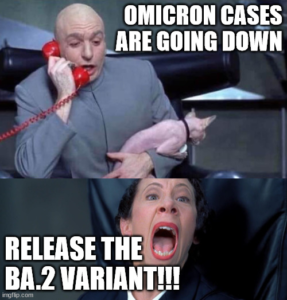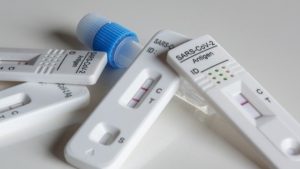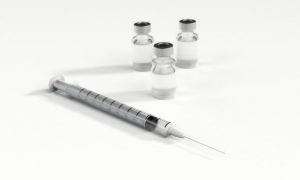We may be done with COVID, but it’s not done with us. There are new (sub)variants to pay attention to, and it’s not clear how this may manifest in terms of a new wave. Some countries have seen a spike in cases, others have not. So we really don’t know what to predict. To complicate matters, more access to at-home testing will add to the forecasting uncertainty (because home-diagnosed cases are not reported to health authorities). But other tools like wastewater monitoring will help shed light on the status of local outbreaks.
 As social and political appetite for sweeping restrictions fades away, navigating the landscape will increasingly become a personal responsibility. One where each person needs to choose to test, isolate, and quarantine in accordance with a set of complicated criteria. Luckily, this handy tool from the CDC makes that determination as simple as answering a couple of questions, and it’s updated with all the latest recommendations for most situations. Share it with your friends, family and co-workers!
As social and political appetite for sweeping restrictions fades away, navigating the landscape will increasingly become a personal responsibility. One where each person needs to choose to test, isolate, and quarantine in accordance with a set of complicated criteria. Luckily, this handy tool from the CDC makes that determination as simple as answering a couple of questions, and it’s updated with all the latest recommendations for most situations. Share it with your friends, family and co-workers!
Long COVID Research
Speaking of living with COVID, millions of Americans have been living with symptoms long after their infections. The National Institutes of Health has been allocated a billion dollars to understand, prevent, and treat long-lasting effects of COVID-19 infections. If you’d like to learn more or sign up to be part of a study, visit this site. Recruitment has been slow-going, so please feel free to pass this information along to anyone who might be interested.
Antiviral Drugs
We’ve been getting a lot of questions about these drugs. The situation is too nuanced to communicate hard and fast rules for everyone. But the bottom line is this: We won’t be dispensing for “just in case” situations. If you do have a confirmed-positive COVID test, let us know, and we’ll walk you through the risk assessment for your circumstances. Additional resources and locations for Test to Treat sites can be found here. Test to Treat is the federal initiative for diagnosing and administering antiviral medications through pharmacies and health centers around the country.
Thinking About Getting Another Booster?
The FDA has approved additional doses of COVID vaccine for many adults. You can now receive a second booster dose if you:
- Received the Johnson & Johnson/Janssen vaccine as both your primary and booster dose at least four months ago
- Are 50 years and older in age and received any booster dose at least four months ago
- Are moderately or severely immunocompromised, ages 12 years and older, and received any booster dose at least four months ago
Additionally, if you’ve gotten all your vaccine doses of the same brand, consider changing it up for the next one. Some evidence suggests that subtle differences between the vaccines may result in a more diverse immune response and therefore increase protection against new variants.
Evusheld
For patients with a weakened immune system, there is preventative treatment (in addition to vaccination) available to help protect against severe COVID-19 infection. Evusheld is a combination of two monoclonal antibodies given by injection to help boost the body’s immunity against COVID-19. Monoclonal antibodies are laboratory-produced molecules made to act as antibodies that can restore, enhance or mimic the immune system’s attack on pathogens. Evusheld is designed to block viral attachment and entry into human cells, thereby neutralizing the COVID-19 virus. The FDA has granted an Emergency Use Authorization (EUA) for Evusheld to be given to individuals at high risk of developing severe COVID-19 illness.
To qualify for Evusheld, you must be age 12 or older AND:
- Not currently be infected with COVID-19 and not had a known recent exposure to an infected individual.
AND:
- Have moderate to severe immune compromise* due to a medical condition or receipt of immunosuppressive medications or treatments and may not mount an adequate immune response to COVID-19 vaccination
OR
- For whom vaccination with any available COVID-19 vaccine, according to the approved or authorized schedule, is not recommended due to a history of severe adverse reaction (e.g., severe allergic reaction/anaphylaxis) to a COVID-19 vaccine(s) and/or COVID-19 vaccine component(s).
*Moderate to severe immune compromise includes:
- Receiving active chemotherapy for any solid tumor malignancy
- Hematological malignancy
- Solid organ transplant and are taking immunosuppressants
- Receipt of CAR-T within 2 years or maintained on immunosuppression
- Hematopoietic cell transplant within past 2 years or maintained on immunosuppression or IgG replacement
- Primary Immunodeficiency
- AIDS (CD4 < 200 or 15%)
- GVHD receiving immunosuppression
- Receiving T- or B- cell compromising drug
- Anatomic or functional asplenia
- Sickle cell anemia or thalassemia
- Aplastic anemia
- Stage IV CKD or worse (i.e., requiring renal replacement therapy)
- Neutropenia (ANC < 1000)
- Myelodysplastic syndrome on therapy
Talk to your doctor about Evusheld if you meet the criteria for treatment.
 Hepatitis B Vaccination Update
Hepatitis B Vaccination Update
All people under age 60 are now recommended to be vaccinated for Hepatitis B. Those over 60 should get vaccinated if they have risk factors, and may still choose to be vaccinated even if they don’t.
For more information about the vaccine and Hepatitis B risk factors, look here.
As always, we want to reward you for making it to the end! Here’s some (probably) good advice for navigating the reopening world this spring.
Take care,
Baskin Clinic

 Hepatitis B Vaccination Update
Hepatitis B Vaccination Update